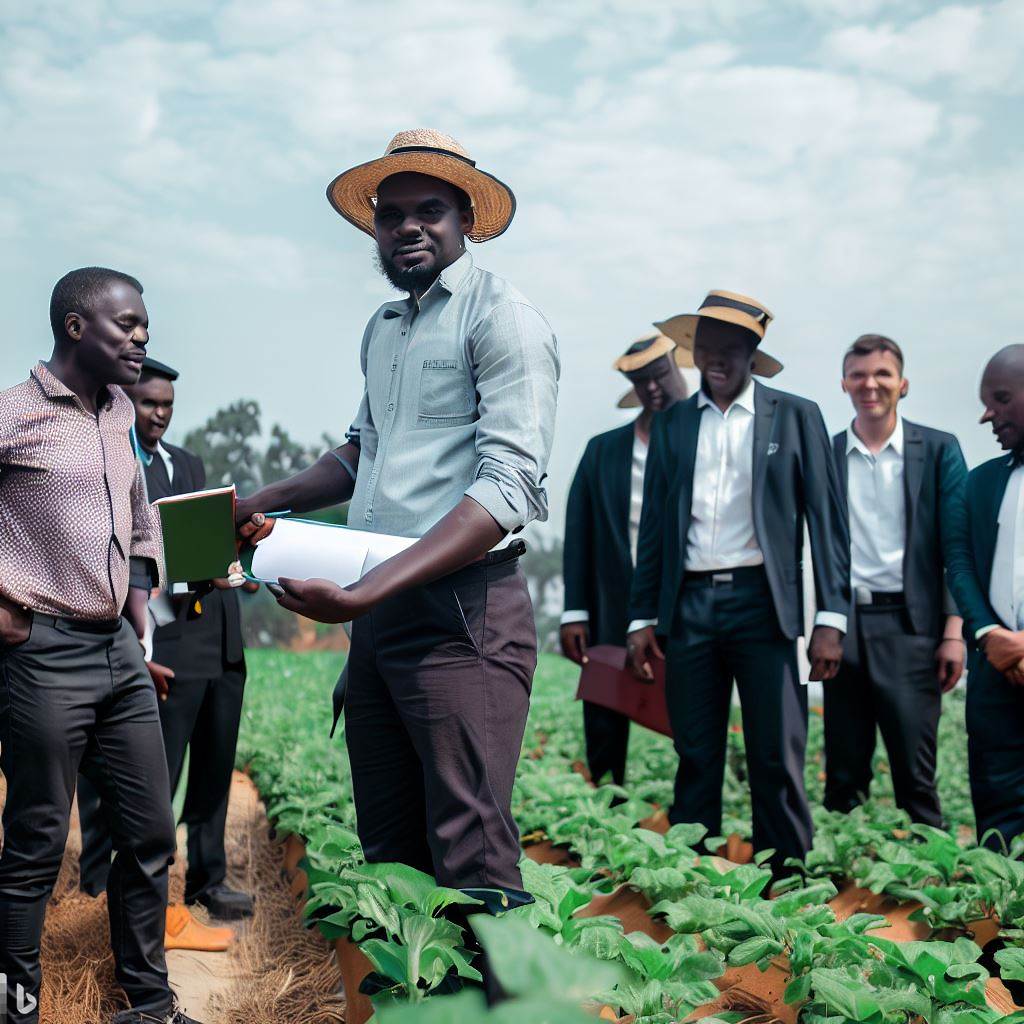Introduction
In this blog post, we delve into the Interviews with successful Agricultural Operations Managers who possess valuable insights and experiences that can significantly contribute to the growth of the agricultural sector.
Learning from their experiences is crucial for aspiring managers and farmers.
In this blog post, we will delve into the interviews conducted with these successful managers, exploring their strategies, challenges, and achievements.
By doing so, we aim to gain a deeper understanding of the best practices in agricultural operations management in Nigeria and how they can be implemented to enhance productivity and sustainability.
The interviews cover a broad range of topics, such as crop selection, pest management, market access, and financial planning.
Each interview provides unique perspectives and valuable lessons that can be applied to different agricultural contexts.
Through these interviews, we hope to inspire and empower individuals involved in the agricultural sector, enabling them to make informed decisions and employ effective strategies for success.
Whether you are a farmer, a manager, or simply passionate about agriculture, this blog post will provide you with practical insights and knowledge that can be applied in your own agricultural endeavors.
So, let’s dive into the world of successful agricultural operations managers in Nigeria and discover how their experiences can shape a thriving and sustainable agricultural landscape.
Background on Agricultural Operations in Nigeria
1. Significance of Agriculture in the Nigerian Economy:
- Agriculture plays a vital role in the Nigerian economy, contributing a significant share to the country’s Gross Domestic Product (GDP).
- It is the largest sector of employment, providing jobs for millions of Nigerians, particularly in rural areas.
- Agriculture serves as a major source of income for small-scale farmers and contributes to poverty reduction.
- The sector also supplies raw materials to various industries, supporting industrial development and ensuring food security.
2. Challenges faced by Agricultural Operations in the country:
- Inadequate access to finance and credit facilities impedes investment and expansion of agricultural activities.
- Insufficient infrastructure, including transport and storage facilities, hampers the efficient movement and preservation of agricultural products.
- Poor agricultural practices, limited mechanization, and low adoption of modern technologies hinder productivity and yield.
- Climate change, frequent droughts, flooding, and unpredictable weather patterns pose significant risks to agricultural output.
- Limited market access and inadequate value chain linkages limit profitability and market opportunities for farmers.
3. Potential for growth and success in the industry:
- Nigeria’s agricultural sector has vast untapped potential, with abundant arable land and favorable agro-ecological conditions.
- The government has initiated various agricultural development programs and policies to stimulate growth and attract investments.
- Advancements in agricultural research and technology aim to improve productivity, enhance crop varieties, and introduce innovative farming techniques.
- The rising population presents a significant market for agricultural products, both domestically and for export.
- Strategic partnerships with international organizations and private sector involvement are creating opportunities for modernization and increased profitability.
In short, agriculture holds great importance in Nigeria’s economy, providing employment, income, and contributing to industrial development.
However, several challenges hinder the full exploitation of its potential.
With the right investments, supportive policies, and the adoption of modern practices, the agricultural sector can experience significant growth and success, ensuring food security, poverty reduction, and economic prosperity for the nation.
Purpose of the Interviews
The objective of conducting interviews with successful agricultural operations managers in Nigeria is to gain valuable insights into their strategies and best practices.
These interviews emphasize the value of their knowledge and experience, allowing readers to learn from their achievements.
By understanding the successful approaches of these managers, readers can apply the learnings to their own agricultural ventures.
Transform Your Career in Nigeria
Discover unmatched expertise with our personalized Career Consulting service. Navigate Nigeria’s job market with a strategy tailored just for you.
Get StartedInterview 1: Dr. Paul Igbinedion
Interviews with Successful Agricultural Operations Managers in Nigeria led us to engage with Dr. Paul Igbinedion, a remarkably accomplished professional in this domain.
His extensive expertise and valuable perspectives illuminated our discussion.
Brief Background
Interviews with Successful Agricultural Operations Managers feature Dr. Paul Igbinedion, a seasoned professional with 15+ years in Nigeria’s agricultural sector.
With a background in Agricultural Economics, he has excelled in diverse managerial roles within acclaimed agricultural enterprises.
His extensive expertise illuminates industry intricacies.
Key Points Discussed
In the context of interviews with successful agricultural operations managers, Dr. Paul Igbinedion underscored the vital role of continual innovation and adaptability within the agricultural sector.
He emphasized the imperative of keeping abreast of modern farming techniques and technologies as solutions to the challenges confronting Nigerian farmers.
Dr. Igbinedion accentuated the pivotal significance of establishing streamlined supply chains to optimize both productivity and profitability.
Moreover, Dr. Igbinedion accentuated the pivotal role of proficient communication and adept relationship-building in ensuring the triumph of agricultural enterprises.
He offered insights into how cultivating a strong rapport with farmers, suppliers, and other stakeholders profoundly contributes to the holistic accomplishment of agricultural ventures.
Successful Strategies
- Implementing precision agriculture techniques to optimize resource utilization and increase crop yield.
- Adopting advanced irrigation systems to overcome water scarcity challenges and improve water efficiency.
- Investing in state-of-the-art machinery and equipment to enhance farm productivity.
Challenges Faced
- Navigating complex government regulations and policies that often hinder agricultural operations.
- Dealing with unpredictable weather patterns, such as droughts and floods, which significantly impact crop production.
- Managing and mitigating the risks associated with pests, diseases, and other crop-related issues.
Lessons Learned
- Flexibility and adaptability are crucial in the agricultural sector, as it is constantly evolving.
- Building strong relationships with stakeholders fosters collaboration and paves the way for success.
- Investing in technology and modern farming practices is essential to stay competitive and increase efficiency.
Interviews with Successful Agricultural Operations Managers offer profound insights into effective strategies, challenges, and learning experiences in Nigerian agribusiness.
Our discussion with Dr. Paul Igbinedion particularly highlights his valuable expertise in adeptly steering agricultural ventures.
His experience stands as a guiding light for aspiring agricultural leaders in Nigeria.
Read: Career Spotlight: How to Become a Farm Manager in Nigeria

Interview 2: Mrs. Abimbola Ogunsanwo
Interviews with Successful Agricultural Operations Managers continue, as we engage with Mrs. Abimbola Ogunsanwo, an accomplished manager in Nigerian agriculture.
Her rich expertise and adept operational management skills have propelled her to the pinnacle of success.
Our conversation delved into pivotal areas. Mrs. Ogunsanwo elaborated on her strategies, navigated challenges, and shared invaluable career insights.
Background of Mrs. Abimbola Ogunsanwo
Mrs. Abimbola Ogunsanwo has over 20 years of experience in the agricultural sector and holds a degree in Agricultural Sciences.
They began their career as a field worker, gaining hands-on experience and a deep understanding of various agricultural practices.
Over time, Mrs. Abimbola Ogunsanwo moved up the ladder and eventually took on managerial roles in different agricultural organizations.
Currently, they hold a top management position in a leading agricultural company in Nigeria.
Key Points from the Interview
Successful Strategies
- Mrs. Abimbola Ogunsanwo emphasized the importance of adopting modern technologies and practices to optimize agricultural operations.
- They highlighted the significance of establishing strong partnerships with local farmers and suppliers to ensure a sustainable supply chain.
- Mrs. Abimbola Ogunsanwo discussed the implementation of efficient irrigation systems and irrigation scheduling techniques, resulting in improved crop yield.
Challenges Faced
- Mrs. Abimbola Ogunsanwo shared that one of the major challenges in the industry is the unpredictable weather patterns, leading to crop losses or lower yields.
- They also mentioned the difficulty in accessing proper funding and financial support to expand operations and invest in new technologies.
- Market fluctuations and price instability were highlighted as additional challenges faced by Mrs. Abimbola Ogunsanwo and their organization.
Lessons Learned
- Mrs. Abimbola Ogunsanwo expressed the importance of continuous learning and staying informed about the latest advancements in the agricultural sector.
- They stressed the significance of building a resilient and adaptable team capable of tackling challenges and driving innovation.
- Through their experiences, Mrs. Abimbola Ogunsanwo learned the need for effective risk management strategies to mitigate the impact of unforeseen events.
Interviews with Successful Agricultural Operations Managers feature insights from Mrs. Abimbola Ogunsanwo, who advocates aspiring managers to seek industry mentorship and networking for robust professional growth. Learning from others’ experiences is emphasized.
The discussion unveils triumphant strategies, encountered challenges, and lessons acquired in agricultural operations management.
Their advice includes adopting modern practices, fostering strong partnerships, and continuous learning, providing an invaluable compass for professionals in the sector.
Publish Your Professional Profile, Business or Brand
Showcase your expertise, gain trust, and boost visibility instantly on Professions.ng.
Publish NowMrs. Abimbola Ogunsanwo stands as a beacon, showcasing the potent positive influence of adept agricultural operations management on businesses and the entire agricultural domain.
Read; Irrigation Methods: A Game-changer for Nigerian Farms
Interview 3: Mr. Segun Awolowo
In the third interview, I had the honor of speaking with Mr. Segun Awolowo, an accomplished agricultural operations manager hailing from Nigeria.
With a diverse agricultural background and extensive managerial experience, Mr. Awolowo has left a profound mark on Nigeria’s agricultural sector.
Mr. Awolowo shared key insights into effective agricultural operations.
He stressed the pivotal role of technology, advocating for modern tools to boost productivity and reduce resource wastage.
Sustainability took center stage, particularly through organic farming and efficient water management, resulting in improved yields and a smaller environmental footprint.
Market research and consumer insights were also highlighted as successful strategies.
Mr. Awolowo adeptly aligned production with demand, enhancing profitability. Despite challenges like rural infrastructure limitations, innovative solutions, including local partnerships, were integral.
The interview underscored valuable career lessons, emphasizing communication and collaboration as cornerstones.
Mr. Awolowo’s adept stakeholder relationships facilitated navigating challenges and seizing opportunities smoothly.
In essence, Mr. Awolowo’s interview offers vital insights for Nigeria’s agricultural success.
His embodiment of impactful leadership, spanning technology, sustainability, resourceful solutions, and relational skills, continues to steer the industry forward.
Read: Sustainability Practices for Nigerian Farm Managers
Common Themes and Insights
In conducting interviews with successful agricultural operations managers in Nigeria, several common themes and strategies emerged.
These insights provide valuable information and can be connected to the broader agricultural industry in the country.
Identifying Common Themes
- Emphasis on Technological Innovation:
- Focus on Sustainable Practices:
- Efficient Resource Management:
- Investment in Human Capital:
Insights from the Interviews
The interviews provided valuable insights into the key factors contributing to the success of agricultural operations in Nigeria:
- Adaptability to Market Demands:
- Collaboration and Networking:
- Government Support and Policy:
- Market Diversification:
Connecting Themes and Insights to the Agricultural Industry in Nigeria
The common themes and insights from these interviews reflect the challenges and opportunities present in the broader agricultural industry in Nigeria.
They highlight the need for continuous innovation, sustainability, and efficient management in order to thrive in a competitive market.
Furthermore, these insights underscore the importance of collaboration and knowledge sharing among industry players.
By fostering a culture of cooperation and actively engaging in networks, the agricultural sector can collectively address challenges and leverage opportunities for growth.
Lastly, the insights shed light on the vital role of government support and policies in shaping the agricultural landscape.
Favorable regulatory environments, access to financing, and incentives for sustainable practices are essential to attract investments and ensure the long-term success of agricultural operations in Nigeria.
In conclusion, the interviews with successful agricultural operations managers in Nigeria reveal common themes and insights that are applicable to the broader agricultural industry.
These themes emphasize the importance of technological innovation, sustainable practices, resource management, and investment in human capital.
The gained insights provide a roadmap for industry players, highlighting the significance of adaptability, collaboration, government support, and market diversification in ensuring long-term success and growth in Nigeria’s agricultural sector.
Read: The Importance of Women Farmers in Nigeria
Conclusion
In this blog post, we discussed the valuable insights gained from interviews with successful agricultural operations managers in Nigeria.
We explored their strategies, challenges, and overall approaches to managing agricultural operations effectively.
By learning from these successful individuals, we can better understand the key factors that contribute to their achievements in the agricultural sector.
Their experiences and knowledge can serve as a guide for aspiring agricultural entrepreneurs in Nigeria.
It is crucial to recognize the importance of continuous learning and improvement in the agricultural industry.
The agricultural landscape is constantly evolving, and by staying informed about the best practices and successful strategies, we can adapt and thrive in this dynamic field.
We encourage readers to apply the insights obtained from these interviews to their own agricultural endeavors.
By implementing proven strategies and learning from the mistakes and successes of others, we can increase the chances of achieving success in our agricultural operations.
In summary, the interviews with successful agricultural operations managers in Nigeria have provided valuable insights and lessons.
By recapitulating the main points, reiterating the importance of learning from these individuals, and encouraging readers to apply these insights, we hope to inspire and empower agricultural entrepreneurs to achieve their goals in Nigeria’s agriculture sector.
Let’s learn from the best and make a positive impact in the world of agriculture.




